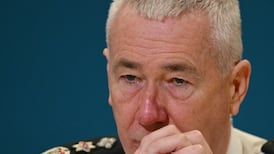The reluctance of a small number of gardaí to co-operate with the prosecution by the Director of Public Prosecutions of four their colleagues in Waterford in 2011 has been criticised by the Garda Siochana Ombudsman Commission which investigated the case.
According to a GSOC report, the behaviour of a small number of gardaí in the case, whom it does not name, led to the emergence of issues in both the investigation and the trial which GSOC believes should be considered by the relevant parties, including the Garda Commissioner.
The case arose after a local man, Anthony Holness, made a complaint in February 2010 at Waterford Garda station about his treatment at the hands of a number of gardaí in the city on January 29th, 2010. The matter was referred by the Garda Commissioner to GSOC.
GSOC investigated the matter and a file was prepared for the DPP, who recommended that four officers, Sgt Alan Kissane, Sgt Martha McEnery, Garda Daniel Hickey and Garda John Burke be prosecuted for different offences.
Following a trial at Waterford Circuit Court in 2011, Sgt Kissane was acquitted of causing harm to Mr Holness, Sgt McEnery was found guilty of assaulting Mr Holness and Garda Hickey was convicted of assault causing harm to Mr Holness.
Garda Burke, who was monitoring CCTV cameras back at Waterford Garda station, was convicted of attempting to pervert the course of justice and attempting to impede the apprehension or prosecution of persons believed to be guilty of an arrestable offence.
Sgt McEnery was given a four-month suspended sentence, Garda Hickey was given a three-year term with 18 months suspended and Garda Burke was given a two-year term with one year suspended, with Sgt McEnery and Garda Burke later failing in appeals against conviction.
Commenting on the case in a five-page report drawn up under Section 103 of the Garda Act 2005, GSOC noted that it was the first prosecution by the DPP following an investigation by GSOC to result in custodial sentences for gardaí.
“The co-operation by members of the Garda Síochána who were themselves not on trial, was, in some cases, exemplary and in other cases, slow and less than optimal,” noted GSOC in the report published on its website yesterday.
Documentation issues
The report noted an effect of this lack of co-operation on the part of some gardaí was that GSOC only received some documentation it required at a very late stage in its investigation, while it never received other documentation it sought, which proved, “at the least, inconvenient”.
“It is a cause of concern to the Ombudsman Commission that documentation which it sought from the Garda Síochána and which was not supplied was then produced in the course of the trial by the defence for certain accused,” stated the GSOC report.
“It is regrettable that the judge in the case (Judge Leonie Reynolds) was caused to wonder at what stage of the proceedings the DPP might have to start treating certain garda witnesses(other than the four accused) as hostile witnesses,” it continued.
GSOC said it shared the judge’s concern in this regard which it understood to relate to a small number of garda witnesses, and it wanted to acknowledge that the majority of gardaí gave their evidence in a professional manner and in line with their earlier statements.
However, GSOC did express concern about another aspect of the case where phone calls made by certain of the accused to Waterford Garda station on the night were recorded and later given to GSOC, but were not deemed admissable at trial after the defence objected.
The court ruled that the practice in the station of recording all incoming and outgoing calls on a particular line was in breach of the relevant statute on recording telephone calls, which requires that at least one of the parties involved must have consented to the recording.
“On consideration of the ruling of the court (that such recordings were inadmissable), the Garda Commissioner may wish to re-evaluate his practice regarding the recordings of such calls and the consents required if it is to permissible to use such recordings in evidence.”










